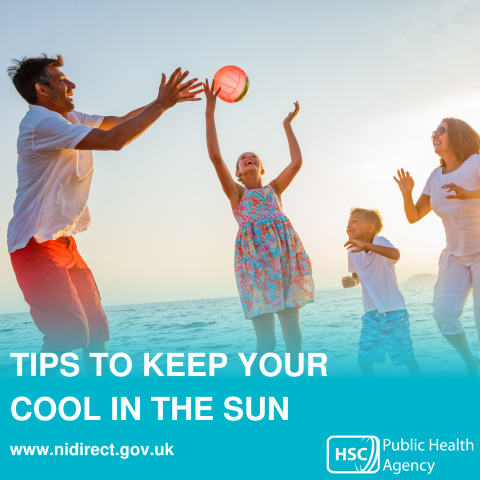Hot weather advice

There are a number of simple steps that will help protect against the sun’s harmful rays:
- Seek shade when the sun is at its strongest – generally 11am to 3pm.
- Cover up in the sun with a long sleeved t-shirt and a hat.
- Wear sunglasses that have a CE mark or carry British Standard BS EN ISO 12312-1 with a UV 400 label and offer 100% UV protection. This will ensure they provide adequate protection from both UVA and UVB. Sunglasses should fit your face well and relatively snugly so that light doesn't enter your eye from around the lens.
- Use sunscreen with a minimum SPF of 15 for UVB protection and 4-star for UVA protection. Apply liberally 30 minutes before going out in the sun and re-apply at least every two hours.
It’s important to remember the care in the sun messages both at home and abroad. Everyone is at risk of sun damage, but certain groups are particularly at risk, including those with fair hair and skin, babies and children, outdoor workers and people with a family history of skin cancer. It is therefore vitally important that all of us take the necessary steps to help protect ourselves in the sun and actively reduce the risks of skin cancer.
High temperatures can bring other health risks, so it is also important to stay cool.
Most of us welcome hot weather, but when it's too hot for too long there are health risks. Knowing how to keep cool during long periods of hot weather can help save lives, so although showers are forecast this week, it will remain very warm so it is important to take steps to keep cool.
Some tips for staying cool are:
- Stay hydrated and drink cold drinks regularly, such as water and fruit juice. Avoid alcohol.
- Wear loose, cool clothing, and a hat if you go outdoors.
- Shut windows and pull down the shades when it is hotter outside. If it's safe, open them for ventilation when it is cooler.
- Keep rooms cool by using shades or reflective material outside the windows. If this isn't possible, use light-coloured curtains and keep them closed (metallic blinds and dark curtains can make the room hotter).
- Have cool baths or showers, and splash yourself with cool water.
- Plan ahead to make sure you have enough supplies, such as food, water and any medications you need.
- Identify the coolest room in the house so you know where to go to keep cool.
Prolonged heat poses a particular risk to older people, young people and those with heart and lung conditions, who may feel the effects of hot weather more acutely than others, so check up on friends, relatives and neighbours who may be less able to look after themselves.
For more info see Hot weather advice | nidirect
